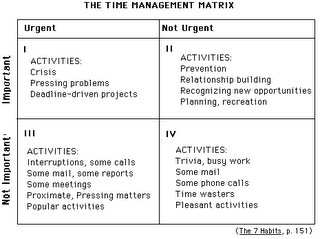
This post has been a while in coming. I had hoped to read this book quicker, but found that I needed to take more time with each habit if I wanted to get the maximum impact from it. I also have been pondering over my own life purpose statement, which the author wanted to be completed (at least in draft form) before reading this chapter. So I have that done (in draft form), so I will post it later, and post this chapter now.
In habit 1 we realize that we can change and we are in charge of our own lives, not the outside factors. In habit 2 we envision what we want to see happen with our lives. Now in habit 3, we put these things into practice. It is the day-in, day-out, doing it.
Effective management is putting first things first. While Leadership decides what the "first things" are, it is management that puts them first, day-by-day, moment-by-moment. Management is discipline, carrying it out.
The area of time management can be captured in a single phrase: Organize and execute around priorities.
The most important thing I learned from this chapter is the Time Management Matrix (see picture above). It goes something like this... There are two factors that define an activity - urgent and important. Urgent means it requires immediate attention. Urgent matters are usually visable. They press on us; they insist on action. A ringing phone for example. Who among us can let it ring without checking the display to see who is calling?
Importance, on the other hand, has to do with results. If something is important, it contributes to your mission, values, goals. We react to urgent matters. Important matters that are not urgent require more initiative, more proactivity. If we dont practice habit 2 and know what is important, we are easily diverted into responding to the urgent.
So Time Management Matrix goes something like this...
- Quadrant 1 = Urgent and important
- Quadrant 2 = Not urgent but important
- Quadrant 3 = Urgent but not important
- Quadrant 4 = Not urgent and not important
Quadrant 1 includes things that are crises or problems. As long as you focus on Quadrant 1 a lot, the crises will continue to grow and never be complete.
People who spend too much time in Quadrants 3 and 4 end up living irresponsible lives. Effective people stay out of 3 and 4 because, urgent or not, they aren't important.
Quadrant 2 is the heart of effective personal management. They are things like building relationships, writing a personal mission statement, long-range planning, exercising, preventative maintenance, preparation - all those things we need to do, but never do, because they aren't urgent.
The only place to get time for Quadrant 2 in the begining is by cutting out quadrany 3 and 4 activities. You can't ignore the urgent and important activities of 1, although that quadrant will shrink in size as you spend more time with prevention and preparation in quadrant 2. You have to be practive to spend time in quadrant 2 as quadrants 1 and 3 work on you. To say yes to quadrant 2 you have to say no to quadrant 1 and 3. The enemy of "best" is often "good" (i hope to read the book "Good to Great" soon which is written based on that principle. The importance of a solid personal mission statment is so that you can refer to it and say no to quadrant 3 and 4 things because you have a bigger "yes" burning inside.
And so there it is... if you actually read all that, congrats. Reading this is a quadrant 2 activity if you go out and apply or study these concepts more, but a quadrant 4 activity if you look at it and don't at least consider it for your life. Which will it be? I hope for myself that writing this will turn out to be a 2 and not a 4.

No comments:
Post a Comment